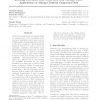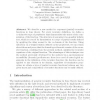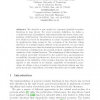30 search results - page 6 / 6 » Induction of Defeasible Logic Theories in the Legal Domain |
ICML
2004
IEEE
14 years 5 months ago
2004
IEEE
Inductive learning of first-order theory based on examples has serious bottleneck in the enormous hypothesis search space needed, making existing learning approaches perform poorl...
TPHOL
2008
IEEE
13 years 11 months ago
2008
IEEE
We describe a new method to represent (partial) recursive functions in type theory. For every recursive definition, we define a co-inductive type of prophecies that characterises...
TLCA
2007
Springer
13 years 11 months ago
2007
Springer
We describe a new method to represent (partial) recursive functions in type theory. For every recursive definition, we define a co-inductive type of prophecies that characterises...
MLQ
2007
13 years 4 months ago
2007
We define two notions for intuitionistic predicate logic: that of a submodel of a Kripke model, and that of a universal sentence. We then prove a corresponding preservation theor...
POPL
2006
ACM
14 years 5 months ago
2006
ACM
Functional programmers often reason about programs as if they were written in a total language, expecting the results to carry over to non-total (partial) languages. We justify su...



